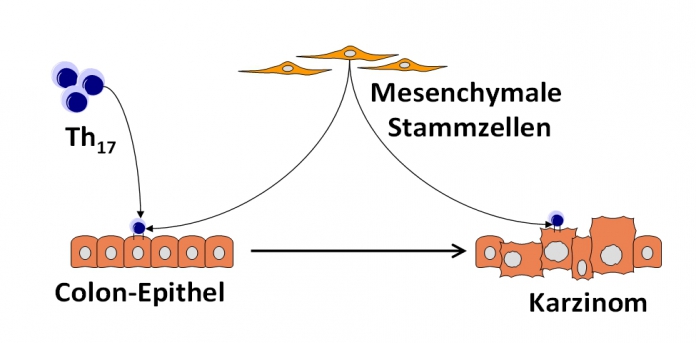Subproject 1: Mesenchymal stem cells (MSC) as treatment for colitis-associated colon-cancerogenesis
Clinic for General, Visceral and Vascular Surgery: Bruns C/Popp FC
Institute of Molecular and Clinical Immunology: Schüler T
The maintenance of intestinal homeostasis requires complex interactions between cells of the intestinal epithelium and immune cells (Asquith M., JExp Med, 2010) On one hand, the maintenance of local immunity must be assured, while on the other hand various immune responses must be impeded in order to prevent the development of chronic inflammatory bowel diseases (CED) (Izcue A., Annu Rev Immunol, 2009). If, for instance, the barrier function of the colon epithelium is disrupted, it is possible that a continued activation of the inetestinal immune cells through the human microbiome may occur. The resulting chronic colitis is often accompanied by the proinflammatory Zytokin Interleukin (IL)-17, which facilitates the development of colon carinoma (Grivennikov S.I., Nature, 2012) (Figure). T-cells and so-called “innate lymphoid cells” (ILC) constitute a central source of IL-17 in the intestines and result in inflammation of the gastrointestinal tract (Ahern P.P., Immunity, 2010; Buonocore S., Nature 2010). Mesenchymal stem cells (MSC), however, can suppress proinflammatory immune responses in the intestines (Duijvestein, Stem Cells, 2011). Up until now, the question of whether immunomodulatory effect of MSC is due to the suppression of IL-17-associated ILC and/or T-cell responses in the intestines has not been researched, and thus that is the research focus of this project.
 |
|
Figure: Diagram of intestinal homeostasis (left) and how a carcinoma can form through a continual inflammatory reaction during colitis. |






